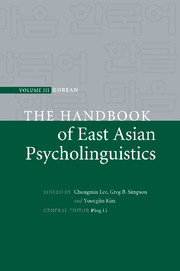Book contents
- Frontmatter
- Contents
- List of figures
- List of tables
- List of contributors
- Preface
- Introduction: Advances in Korean psycholinguistics
- Part I Language acquisition
- 1 Acquisition of the subject and topic nominals and markers in the spontaneous speech of young children in Korean
- 2 The acquisition of argument structure and transitivity in Korean: a discourse-functional approach
- 3 Acquisition of case markers and grammatical functions
- 4 Do Korean children acquire verbs earlier than nouns?
- 5 The acquisition of the placement of the verb in the clause structure of Korean
- 6 Learning locative verb syntax: a crosslinguistic experimental study
- 7 Language-specific spatial semantics and cognition: developmental patterns in English and Korean
- 8 Acquisition of negation in Korean
- 9 The acquisition of Korean numeral classifiers
- 10 Acquisition of Korean reflexive anaphora
- 11 The Korean relative clause: issues of processing and acquisition
- 12 The accessibility hierarchy in Korean: head-external and head-internal relative clauses
- 13 Development of functional categories in child Korean
- 14 The acquisition of modality
- 15 The syntax of overmarking and kes in child Korean
- 16 Events in passive development
- 17 Universal quantification in child grammar
- 18 Acquisition of prosody in Korean
- 19 Korean as a heritage language
- 20 Maturational effects on L2 acquisition
- 21 L2 acquisition of English articles by Korean speakers
- 22 The acquisition of wanna contraction by adult Korean learners of English
- 23 Phonological abilities of Korean–English bilinguals
- 24 Parameters on languages in contact: an altered view of codeswitching
- 25 Influence of socio-psychological categories in bilingual interaction
- 26 Ontological concept versus shape in word learning from a crosslinguistic point of view
- 27 Notes on Korean Sign Language
- Part II Language processing
- References
- Name index
- Subject index
7 - Language-specific spatial semantics and cognition: developmental patterns in English and Korean
from Part I - Language acquisition
Published online by Cambridge University Press: 05 June 2012
- Frontmatter
- Contents
- List of figures
- List of tables
- List of contributors
- Preface
- Introduction: Advances in Korean psycholinguistics
- Part I Language acquisition
- 1 Acquisition of the subject and topic nominals and markers in the spontaneous speech of young children in Korean
- 2 The acquisition of argument structure and transitivity in Korean: a discourse-functional approach
- 3 Acquisition of case markers and grammatical functions
- 4 Do Korean children acquire verbs earlier than nouns?
- 5 The acquisition of the placement of the verb in the clause structure of Korean
- 6 Learning locative verb syntax: a crosslinguistic experimental study
- 7 Language-specific spatial semantics and cognition: developmental patterns in English and Korean
- 8 Acquisition of negation in Korean
- 9 The acquisition of Korean numeral classifiers
- 10 Acquisition of Korean reflexive anaphora
- 11 The Korean relative clause: issues of processing and acquisition
- 12 The accessibility hierarchy in Korean: head-external and head-internal relative clauses
- 13 Development of functional categories in child Korean
- 14 The acquisition of modality
- 15 The syntax of overmarking and kes in child Korean
- 16 Events in passive development
- 17 Universal quantification in child grammar
- 18 Acquisition of prosody in Korean
- 19 Korean as a heritage language
- 20 Maturational effects on L2 acquisition
- 21 L2 acquisition of English articles by Korean speakers
- 22 The acquisition of wanna contraction by adult Korean learners of English
- 23 Phonological abilities of Korean–English bilinguals
- 24 Parameters on languages in contact: an altered view of codeswitching
- 25 Influence of socio-psychological categories in bilingual interaction
- 26 Ontological concept versus shape in word learning from a crosslinguistic point of view
- 27 Notes on Korean Sign Language
- Part II Language processing
- References
- Name index
- Subject index
Summary
Introduction
What is the relation between the way we talk and the way we think about the world? More specifically, does the language we speak influence the way we think, or does universal cognition guide the way we talk about the world? Or, perhaps, language and cognition are two independent entities, and thus do not affect each other. These are classic questions that have preoccupied the minds of psychologists and linguists for quite some time. Until the early 1990s, the predominant view – influenced by Chomsky's universal grammar (1965) – was that human languages share a significant number of universal properties and that these properties are shaped by universal cognition. In the last few years, however, with evidence of extensive and significant differences across languages particularly in the semantic domain of space, the debate on language and cognition has been re-kindled and has become, once again, a central issue in psychology, linguistics and cognitive science. In this debate, the Korean spatial semantic system, being very different from much-researched languages like English, has become an intriguing testing ground for evaluating differing theories.
In this chapter, I present an overview of the contrasting theories that have been presented so far on the relation between language and cognition. Then, I review some of the recent crosslinguistic studies that have been conducted, including my own, in the domain of space comparing learners/speakers of English and Korean.
- Type
- Chapter
- Information
- The Handbook of East Asian Psycholinguistics , pp. 107 - 126Publisher: Cambridge University PressPrint publication year: 2009

